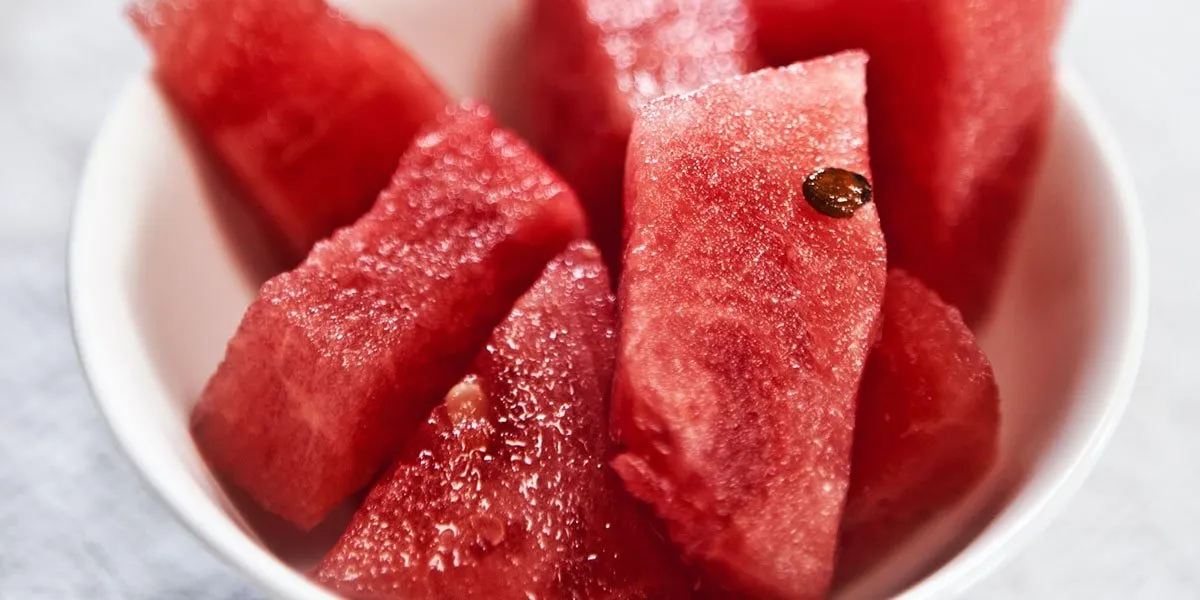Melons are generally considered very mild fruits, mainly because of their high water content. Watermelon is probably the best example of this, but it’s surprisingly also one of the more acidic melon varieties, with a relatively low pH value compared to other well-known melon types.
According to Clemson University, the average watermelon has a pH value within the 5.18 to 5.6 range. This means that watermelon is considered mildly acidic. Watermelon is more acidic than a cantaloupe melon (6.13-6.58 pH) or honeydew melon (6.0-6.67 pH).
For people that suffer from acid reflux or heartburn problems, it can be difficult to find fruits that can fit into their diet. Most fruits are generally acidic in nature. Finding mild, non-acidic options can be challenging! A refreshing natural snack like watermelon should generally be safe for most people, though.
Watermelons Are Acidic, Not Alkaline
To understand whether a fruit is acidic or alkaline, you must first understand what pH values are. Simply put, pH is a measurement unit in chemistry, which explains the concentration of hydrogen ion units in a substance. The range can vary from 0 to 14, with 7 being the neutral middle. A value of 0 is considered extremely acidic, while a pH of 14 is extremely alkaline.
Water has a neutral pH value of 7, and watermelons are mostly water (92% water content). So one would assume that the acidity of a watermelon is close to 7. In reality, watermelons contain some amount of acidic substances, which makes these fruits slightly acidic.
Interestingly enough, the popular summer fruit is considerably more acidic than their milder green honeydew, and orange cantaloupe counterparts. So let’s find out what type of acid causes this relative acidity in watermelons.
How Much Acid Is In A Watermelon?
A 2012 scientific study by Liu et al. determined citric acid to be the most important type of acid in watermelon, with 23.92-64.87 mg/g. Other acids found in watermelon include malic acid (11.68-24.44 mg/g), quinic acid (0.56-3.73 mg/g), and tartaric acid (0.43-1.31 mg/g).
Watermelon is generally considered a low-acid fruit. With increased ripeness, the acid content of watermelons tends to decrease. The summertime fruits are therefore not all evenly acidic. There are a lot of environmental factors that will eventually determine how much acid you’ll ingest.
If you’re worried about the acid content in watermelon, then there’s no need. The pH values and low acid content of the fruit are considered safe for acid reflux patients. As long as you make sure the fruit is sufficiently ripe, there should be no problem eating this tropical delicacy.
Watermelon & Acid Reflux Risk
If you’re suffering from acid reflux problems or even Gastroesophageal reflux disease (GERD), it can be challenging to find fruits that are ‘safe to eat’ for this target demographic. For watermelons, this risk is low to non-existent. That’s great news if you ever suffered from heartburn, but that doesn’t mean that you shouldn’t take some simple precautions.
After all, watermelons are not completely non-acidic. They do have a pH that’s in a safe range, but it’s still recommended to avoid mild symptoms by following some of the following best practices:
- Limit your daily intake of watermelon where possible
- Mix watermelon with less acidic fruits, e.g. mix with canteloupe and honeydew melon
- Drink plenty of water together with the fruits you ingest
- Avoid eating mildly acidic fruits on an empty stomach
A Refreshing, Mild Fruit Snack
On a hot summer’s day, eating a few watermelon slices or cubes can be a great way to cool down. The fruit is packed with water and healthy vitamins and minerals. So it’s a great way to snack on something and refresh yourself. The popular fruit is widely available and is simply delicious, so feel free to eat them every once in a while.
Compared to other melon varieties, watermelons can be considered relatively acidic. There are definitely less acidic options out there, particularly the more popular canteloupe and honeydew we mentioned earlier. But also make sure to look into other tropical fruits with low acidity such as dragon fruit.
On the pH overview of all fruit types, watermelons are definitely on the more alkaline side of the spectrum. Compared to other summer fruits, watermelons are not that acidic at all. Take the low pH value of strawberries, for example, you would assume these are safe summer snacks, but they can be quite acidic. So it’s great that you took the time to check if watermelons are low in acidity, which they are!

